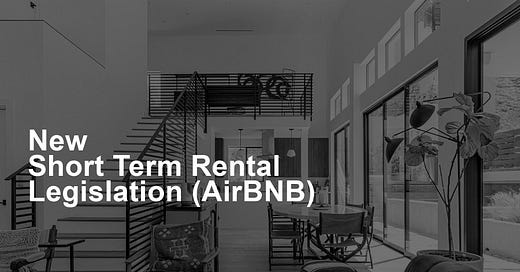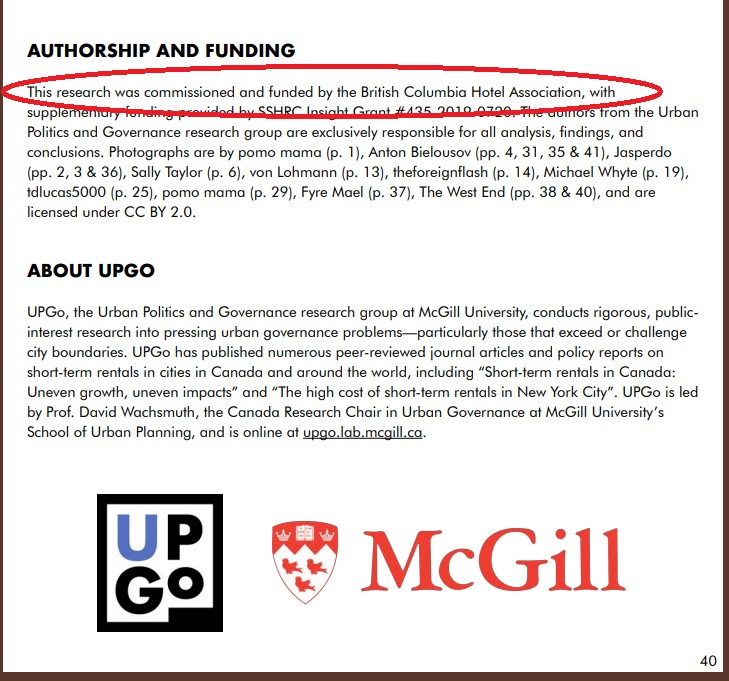On October 16th, the Provincial government announced new changes to short term rental regulations. Please note that many municipalities such as Vancouver already have bylaws that meet or exceed the requirements from the Province. The new legislation is meant as a minimum requirement, and that municipalities can still enforce further restrictions. Example: The province is allowing secondary suites to be used for STR(short term rentals), however this will not be permitted by the City of Vancouver. STR operators in Vancouver will notice little change to their requirements, however the game changer may be if the Province is successful in forcing platforms to share booking data with authorities.
Well intentioned or virtue signaling?
“The number of short-term rentals in B.C. has ballooned in recent years, removing thousands of long-term homes from the market.” said premier David Eby. His statement goes on to list a variety of data points from a McGill study chastising STRs. The study even suggests that STRs are a major contributing factor in the increase of long term rental rates in B.C. The premier fails to mentioned that the study was commissioned and paid for by the BC Hotel Association. ( Link to Study )
There are approximately 4000 AirBNB listings in Vancouver, of those only 132 licenses have been suspended, 120 violation tickets were issued and 54 units were flagged for investigations and audits(as of July 2023), yet the Province wants you to believe that this legislation is going to open the flood gates, creating thousands of new long term rentals. I can confidently tell you that it will not. Sure, some illegally run STRs may sell or convert to long term rentals, but most hosts will continue to operate within the law, and transition to 90 day rentals during the off season. Forcing a couple hundred AirBNBs into LTR’s will be a drop in the bucket and have little effect on the housing crisis, or on prices.
We are in a housing crisis; what we need is to dramatically increase supply. This can only be accomplished by removing the red tape on developers imposed by municipalities, and allowing further densification. The transition of SFH lots to allow multi’s is a good start, but its not nearly enough. We need increased density around transit hubs, and a reworking of west-side community plans to allow the building of multi-story condos.
Overview of new legislation:
Exemptions:
Most municipalities under 10,000 population (except those adjacent to larger municipalities)
Mountain Resort Areas and Designated Resort Regions
Whistler, Tofino, Ucluelet, Harrison Hot Springs, Osoyoos, Valemount, Sun Peaks, Rossland, Kimberley, Fernie, Invermere, Radium Hot Springs, Golden, and Revelstoke.
Reserve lands
Nisga’a Lands or the Treaty Lands of a Treaty First Nation (unless the Nation chooses to opt into all or part of the legislation through a coordination agreement with the Province)
Agri-tourism accommodations
Future regulations are being drafted to exempt additional types of properties which are not the intended target of the proposed act, including timeshares and fishing lodges.
Hosting Requirements
STR’s will be limited to the hosts principal residence
Secondary suite/laneway house permitted
Listings will need to include hosts’ local government business licence number and, when launched, a provincial registry number.
STR redefined as any rental less than 90 days. (Previously was 30 days)
Enforcement
Municipalities can increase bylaw infractions from $1000/day to $3000/day
Requiring platforms to share booking data with the Province which will also be shared with local governments to support bylaw enforcement.
Force platforms to remove listings that are in violation of provincial rules
Effective Timeline
Immediately: Increased fines and tickets, business licensing authority for regional districts
May 1, 2024: Principal residence requirement (including definition of exempt areas or accommodations), changes to legal non-conforming use protections
Summer 2024: Data sharing
Late 2024: Provincial registry launch, requiring platforms to remove listings without valid provincial registry numbers
Links:





I find it criminal that this new law defines short term as less than 90 days when the world standard is 30 days , virtually everywhere. It's also so anti freedom and so anti property rights that I think it will continue the long term acceleration of capital flight and insufficient investment.